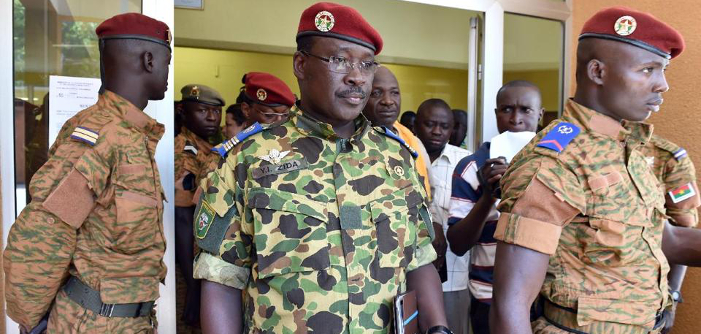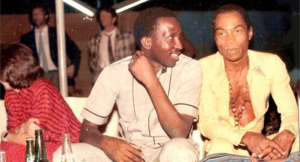UN international mediators brandished the threat of sanctions if the army refused to back down and allow a civilian transfer of power.
The UN envoy for West Africa, Mohamed Ibn Chambas, told a news conference in the Burkinabe capital that he and African leaders had pressed the demand in a meeting with the country’s top military brass. If the army refuses, “the consequences are pretty clear”, he said. “We want to avoid having to impose sanctions on Burkina Faso.”
Burkina Faso’s army seized control of the capital’s main square on Sunday, firing tear gas and shots in the air to disperse thousands of protesters denouncing a power grab by the military.
Troops moved into Place de la Nation in Ouagadougou and took over the national television headquarters, in both a show of force and defiance against calls by the international community and protesters for a return to civilian rule.
The military had stepped into the power vacuum left by president Blaise Compaore, who was forced to resign in the wake of violent street demonstrations over his 27-year-rule of the west African state that some have likened to the Arab Spring.
In another development, The US State Department also called on the military to immediately transfer power to civilian authorities.
Hundreds of thousands of protesters, furious at plans to extend Compaore’s rule in the impoverished landlocked country, had massed on the streets of Ouagadougou on Thursday, some going on a rampage and setting the parliament and other public buildings ablaze.
Curiously, under Burkina Faso’s constitution, the speaker of parliament was supposed to step in as interim head of state following the president’s resignation.
But like the army are renown for in West Africa in the past decades, the army instead named the second-in-command of the presidential guard, Lieutenant Colonel Isaac Zida, as head of the transitional authority – Coup de dat.
Zida, 49, said he was appointed to ensure a “smooth democratic transition” and promised to consult with the political opposition and civil leaders.
He met Sunday with opposition leaders including the bloc’s main chief Zephirin Diabre, former prime minister Roch Marc Christian Kabore and ex-foreign minister Ablasse Ouedraogo.
The talks came after several thousand people joined a march against the military earlier Sunday.
“No to the theft of our victory, long live the people!” said one banner, while others read: “The soldiers have stolen our revolution”, “Zida get out!” and “Zida is Judas.”
The mediators from the United Nations, the African Union and the Economic Community of West African States told Zida and other military leaders that civilian rule needed to be restored.
But US State Department spokeswoman Jan Psaki voiced international mistrust at the army’s move, saying the United States condemned its attempt to “impose its will” on the people of Burkina Faso.
“We urge civilian leadership to be guided by the spirit of the constitution of Burkina Faso and to move immediately towards free and fair presidential elections,” she said in a statement.
Shortly after the military named Zida as interim leader, opposition and activist leaders had issued a joint statement demanding a “democratic and civilian transition” in the country of nearly 17 million people. “The task of managing the transition falls by right to the people. In no case can it be confiscated by the army,” it said.
The crisis in Burkina Faso – formerly called Upper Volta in its era as a French colony before becoming independent in 1960 and changing its name in 1984 — is the worst since a wave of unrest three years ago.
From March to June 2011, a wave of army mutinies swept the country, alongside public protests over high food prices, unemployment and the looting of property by troops.
Compaore was only 36 when he seized power in a 1987 coup in which his former friend and and colleague, Thomas Sankara, was ousted and assassinated. After that he clung to power for the following decades, after being re-elected president four times since 1991.
The uprising that finally forced him out was sparked by plans to change the constitution to allow Compaore to stand yet again for elections next year.
Compaore and his wife have taken refuge in neighbouring Ivory Coast where they are being put up in a luxury government mansion in the capital Yamoussoukro.
It will be recalled that Thomas Sankara was murdered in a successful coup plot on the birthday of Afrobeat legend Fela Anikulapo Kuti. Shortly before his assassination on the 15th of October, 1987, Thomas Sankara was at the Afrika Shrine to pay Fela a courtesy visit.
Fela was quoted after Sankara’s death as saying “His departure is a terrible blow to the political life of Africans, because he was the only one talking about African unity, what Africans need, to progress”
Later Fela released “Underground System” in the aftermath of Sankara’s death in an effort to expose a system by which military and political elites throughout Africa conspired together to remove any emergent leader threatening the status quo (and the post-colonial hegemony’s ability to keep its trotters in the trough).”
Yahoo News contributed to this story





